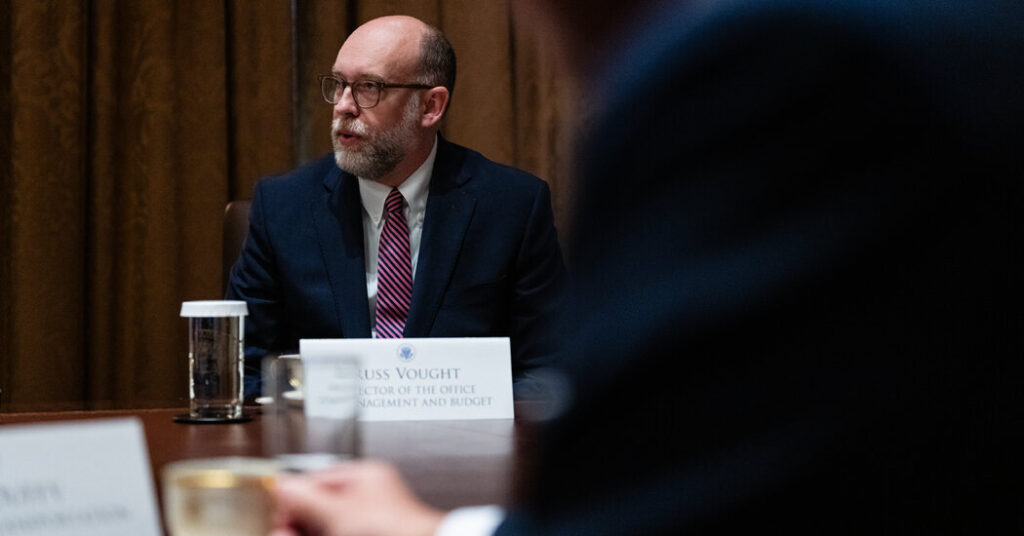The top two Republicans and Democrats on the congressional appropriations committees are quietly protesting the White House’s decision to take down a special website tracking federal spending, escalating a battle between Congress and President Trump over spending powers.
In a previously undisclosed letter sent last month to Russell T. Vought, the director of the Office of Management and Budget, the lawmakers questioned the rationale for shutting down the website, which they and advocacy groups said was a violation of the law.
“We look forward to working with you to restore public access to apportionment data in accordance with statute,” they wrote.
The letter was signed by Representative Tom Cole of Oklahoma and Senator Susan Collins of Maine, the Republican chairs of the House and Senate appropriations committees, and the two senior Democrats on those panels, Representative Rosa DeLauro of Connecticut and Senator Patty Murray of Washington.
It was a rare instance of bipartisan pushback from members of both the House and the Senate against the White House for its actions, at a time when the Trump administration is mounting an aggressive challenge to the legislative branch’s spending prerogatives.
Mr. Cole’s signature was a particularly significant development since he had not joined in a previous bipartisan congressional letter taking Mr. Trump’s budget office to task on spending issues. In a brief interview on Monday, he said he believed the website should be restored, a view shared by Ms. Collins.
“All four of us have indicated and advised O.M.B. that it is not optional to do the public website,” Ms. Collins said.
The website in question was required by Congress in 2022 and is intended to provide current information about where federal dollars are going to make sure that spending is in line with congressional directives and that agencies are not spending inappropriately.
Though the website was established during the Biden administration, its origin was in part the result of the Trump administration’s decision to withhold some congressionally approved aid for Ukraine during Mr. Trump’s first term.
It has come to be relied on by lawmakers and outside groups for real-time tracking of congressional spending. Two public interest groups — Citizens for Responsibility and Ethics in Washington and Protect Democracy — have filed suit to force the administration to restore it.
When the website was shut down at the end of March, Mr. Vought wrote Ms. Murray that his office had “determined that it can no longer operate and maintain this system because it requires the disclosure of sensitive, predecisional and deliberative information.” He said such disclosures “have a chilling effect on the deliberations within the executive branch.”
In a legal filing in response to the lawsuits, the administration gave a broader explanation, saying that “the statutes at issue — which would require O.M.B.’s disclosure of deliberative information — violate the separation of powers and Article II, and thus are unconstitutional and unenforceable.” The White House has made similar claims in other cases as it tried to exert an expansive view of executive authority.
After the White House decision to shut down the website, the Government Accountability Office — an arm of Congress — said in its own letter to Mr. Vought that his actions were “very concerning” and noted that the website was required by multiple statutes. It also disputed his reasoning for the decision.
“While there may be some information that is sensitive if disclosed publicly, it is certainly not the case that all apportionment data meets that standard,” the agency said in its April letter. “Where there is such sensitive data that should be protected from public disclosure, those would be the exception and should not serve to take down the entire database.”
While the letter from the four leaders was reserved in tone, the two top Democrats on the appropriations panels have been harsh in their criticism. Ms. Murray called the White House justifications “laughable.” Ms. DeLauro said in a statement that “the law is clear, and O.M.B. is breaking it.”
“Without a reasoned justification, we must assume that the agency is motivated to hide their decisions from the public because they cannot, or are too afraid, to justify them,” Ms. DeLauro said.
While Ms. Collins has publicly broken with the White House on other issues, including its decision not to spend congressionally approved emergency aid, the decision by Mr. Cole to sign on was striking given he is much more closely allied with the White House. But he expressed exasperation last week with the Trump administration after a meeting with top Republican appropriators and Mr. Vought was canceled, before eventually being rescheduled.
“We’re still developing our relationship,” Mr. Cole said of his and his committee’s dealings with Mr. Vought. “We are getting better at it, but we are not there yet.”
In their letter to Mr. Vought, the appropriations leaders said it was crucial to resolve their differences as the spending debate is getting underway on Capitol Hill.
The letter said it was “essential for O.M.B. and the appropriations committees to maintain a collaborative working relationship so that we can advance appropriations legislation on behalf of the American people with the full benefit of the administration’s knowledge and input.”


